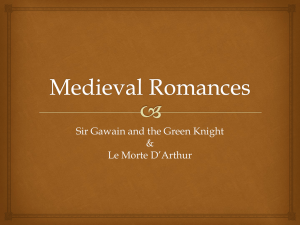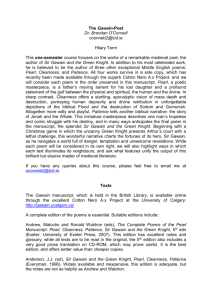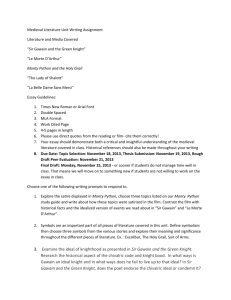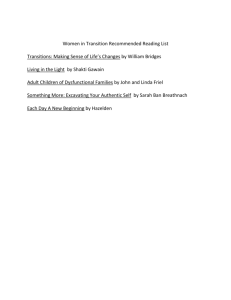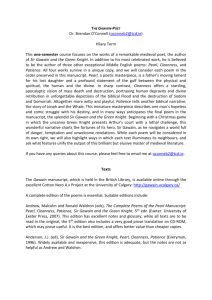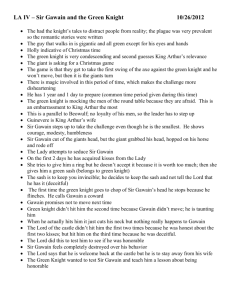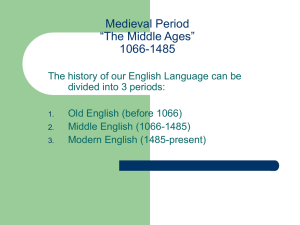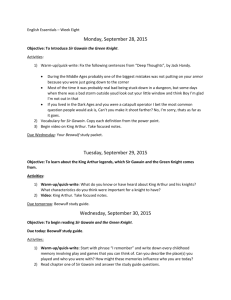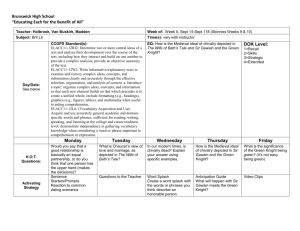The Heroic Life as Portrayed by Sir Gawain and Atticus Finch
advertisement
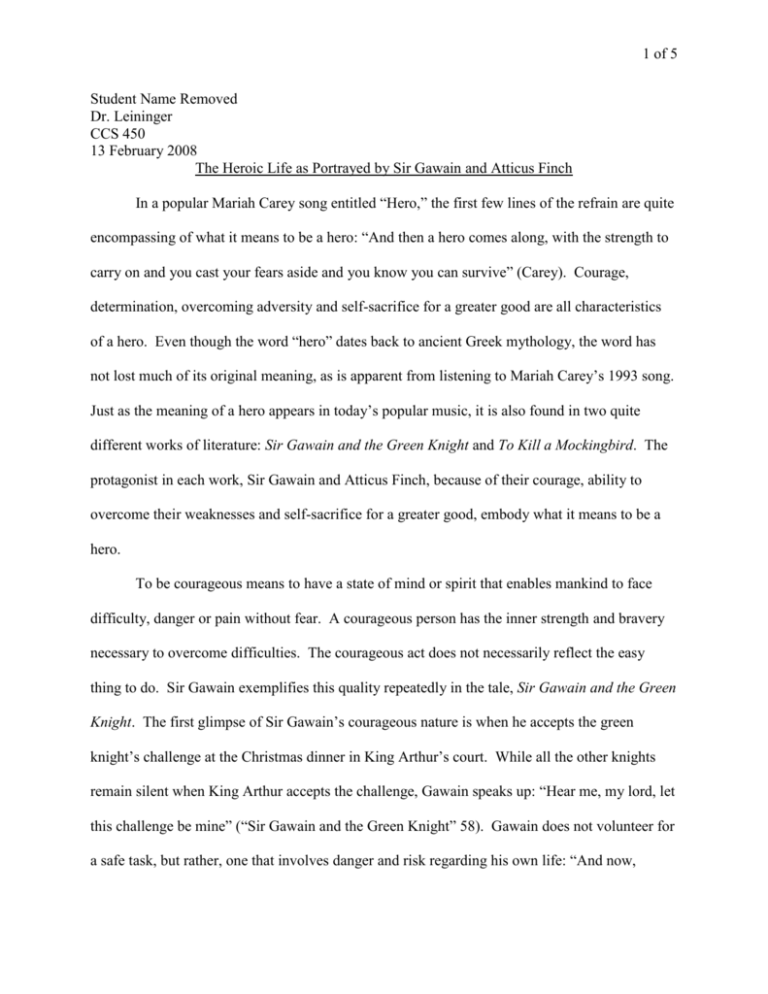
1 of 5 Student Name Removed Dr. Leininger CCS 450 13 February 2008 The Heroic Life as Portrayed by Sir Gawain and Atticus Finch In a popular Mariah Carey song entitled “Hero,” the first few lines of the refrain are quite encompassing of what it means to be a hero: “And then a hero comes along, with the strength to carry on and you cast your fears aside and you know you can survive” (Carey). Courage, determination, overcoming adversity and self-sacrifice for a greater good are all characteristics of a hero. Even though the word “hero” dates back to ancient Greek mythology, the word has not lost much of its original meaning, as is apparent from listening to Mariah Carey’s 1993 song. Just as the meaning of a hero appears in today’s popular music, it is also found in two quite different works of literature: Sir Gawain and the Green Knight and To Kill a Mockingbird. The protagonist in each work, Sir Gawain and Atticus Finch, because of their courage, ability to overcome their weaknesses and self-sacrifice for a greater good, embody what it means to be a hero. To be courageous means to have a state of mind or spirit that enables mankind to face difficulty, danger or pain without fear. A courageous person has the inner strength and bravery necessary to overcome difficulties. The courageous act does not necessarily reflect the easy thing to do. Sir Gawain exemplifies this quality repeatedly in the tale, Sir Gawain and the Green Knight. The first glimpse of Sir Gawain’s courageous nature is when he accepts the green knight’s challenge at the Christmas dinner in King Arthur’s court. While all the other knights remain silent when King Arthur accepts the challenge, Gawain speaks up: “Hear me, my lord, let this challenge be mine” (“Sir Gawain and the Green Knight” 58). Gawain does not volunteer for a safe task, but rather, one that involves danger and risk regarding his own life: “And now, 2 of 5 Gawain: think. Danger is yours to overcome and this game brings you danger. Can the game be won?” (62). Gawain acts bravely despite any fear or uncertainty he may have. On the day of his departure to find the green chapel, Gawain’s words reflect his valiant spirit: “Should I waste my time with fear? Whether pleasant or wild, fate must be put to the test”(67). En route to the green chapel, Gawain’s guide warns him of the dangers of the green knight. However, Gawain responds: “If I rode away, fled for fear, as you tell me, I’d be a coward no knight could excuse. Whatever comes, I’m going to that chapel, and I’ll meet that wild man: however it happens it will happen, for evil or good, as fate decides” (114). Even on the day Gawain is to face his own death, he remains courageous. Similarly, in To Kill a Mockingbird, Atticus Finch also acts courageously when confronted with dangerous and troublesome situations. It is an audacious act for Atticus to defend Tom Robinson, a black man, during a time when such an action was not socially acceptable. Atticus Finch, in defending Tom, challenges the societal view that all blacks are “liars” and “criminals.” On the contrary, he believes that Tom Robinson is a good man and that he is innocent. Even though it results in torment from some of his neighbors Atticus defends Tom sincerely--an action which takes both nerve and bravery. Being courageous doesn’t mean that Sir Gawain and Atticus Finch did not struggle with their own weaknesses. A second characteristic of a hero is that in spite of their weakness and imperfection they are able to persevere. Sir Gawain faces his weakness of greed and temptation during his encounter with the king’s wife, especially when she offers him the silk belt that can save his life: “His heart reached for protection, like a thief for a gem…He held his tongue, allowed her to speak-and she pressed it on him, urgent-and he was ready to surrender, then smiling, surrendered” (104). Sir Gawain collapses into his own weakness when he takes the belt from the king’s wife. He redeems himself as a hero because of his repentance and perseverance 3 of 5 to be a good man despite this failure. After confronting the green knight, Sir Gawain says that he will keep the belt “not for its gold, nor its lovely silk, nor its polished stones…but to see it, often, as a sign of my sin…to remember the weakness and error of this feeble flesh…this belt will humble my heart” (122). Sir Gawain does not let his mistakes hinder him; instead he learns from them and strives to be a better man because of them. Atticus Finch also struggles in his life; however, he does not let these obstacles bring him down. He is a hero because he perseveres, and like Gawain, strives to become a better person in response to his mistakes. For example, Atticus is a single father which is no easy task, yet he continuously tries to set a good example for Jem and Scout whether it is by the way he treats his neighbors or how he calmly reacts when confronted by Mr. Ewell. Even though Atticus loses Tom Robinson’s trial, he does not give up hope and remains confident that he can win the appeal. Atticus Finch and Sir Gawain are examples of how heroes at times fall and fail, but more importantly, they get back up and persevere after their fall. The third important characteristic that categorizes Sir Gawain and Atticus Finch as heroes is that they each sacrifice a part of themselves for a greater good. Sir Gawain sacrifices his life when he accepts the green knight’s challenge, all for the honor and defense of King Arthur’s court. Speaking to King Arthur, Gawain offers himself in place of the king to play the green knight’s game: “And I am the slightest, the dullest of them all; my life the least, my death no loss-my only worth is you, my royal uncle, all my virtue is through you” (58). One year later, the promise Gawain made is even more real as he faces the axe of the green man. The green knight says to him, “You’ve made a difficult journey, and you came on time, you’ve kept your faith…We’re completely alone, in this valley; no one can come between us, however fiercely we fight. Take off your helmet, and take my axe-stroke” (117). The willingness to sacrifice his own 4 of 5 life and the loyalty shown by Gawain in accepting and carrying out the green man’s challenge truly reflects his heroic nature. Atticus Finch personifies this heroic attribute of self-sacrifice as well, especially in the way he prioritizes helping others rather than trying to create his own success. During the very first scene of the film, Atticus helps his neighbor Mr. Cunningham with legal work even though Mr. Cunningham is only able to pay with food from his farm. Later, when faced with the choice whether or not he to defend Tom Robinson, Atticus chooses to self-sacrifice his career and the way the town views him in order to defend an innocent man. Even when Mr. Ewell spits at Atticus in front of Jem, Atticus sacrifices his pride when he doesn’t fight back. These self-sacrificing actions for a greater good are consistent with Atticus’s values and are what ultimately make him a hero and an honorable person. The stories of Sir Gawain and Atticus Finch are extremely valuable in reflecting upon our own lives and how we too have the opportunity to be heroes. The qualities that make Gawain and Atticus a hero are no different from what we are capable of in our own lives. From the lyrics of the song “Hero,” it is apparent that Mariah Carey recognizes that each person has the choice to be brave, overcome adversity and find the hero within themselves. Sir Gawain and Atticus were able to rise to the challenge of being brave, persevering despite their weaknesses and sacrificing a bit of themselves for a greater good. Their stories are a source of inspiration during our journey to live heroically. 5 of 5 Works Cited Carey, Mariah. Lyrics. “Hero.” Music Box. CD. Columbia Record Company. 1993. Sir Gawain and the Green Knight. Trans. Burton Raffel. New York: Signet Classic, 1970.
